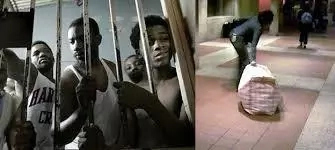Punishment For Offences Relating To Unlawful Assemblies And Breaches Of Peace In Nigeria
Offences Relating To Unlawful Assemblies And Breaches Of Peace
Section 40 of the 1999 Constitution of the Federal Republic of Nigeria (As amended) guarantees the right to peaceful assembly or association as one of the cardinal rights protected by Chapter IV.
On the strength of this, Nigeria is a country where people are allowed to associate freely. Whether for religious, trade, political or other lawful affairs, the law allows people to converge, disperse, and converge again to further their purposes.
👉 Relocate to Canada Today!
Live, Study and Work in Canada. No Payment is Required! Hurry Now click here to Apply >> Immigrate to CanadaRead Also: Armed Robbery Under Nigeria Criminal Law: Definition, Menace, Consequences, Punishment

This is because, the law also recognizes the strength that is in unity and the safety that is in numbers. The law recognizes that one of the most basic freedoms any human being can have is the freedom to associate freely with whomsoever he wants provided the association is for lawful purposes.
The objective of the law in seeking to regulate associations is to ensure that no such association is formed to the detriment of law and order and the peace and well-being of every human being.
In countries run by dictatorships which Nigeria is thankfully not, there are always unfortunate restrictions on the freedom of association.
Dictators fearing the gathering of their people always prevent the forming of associations. Those formed mostly at the behest of the state are often kept under asphyxiating leashes. In truth, dictators fear nothing more than popular uprisings which could be precipitated by small associations.
Read Also: Punishments For Kidnapping Under Nigerian Law
Definitions of Assembly
The 7th Edition of the Oxford Advanced Learner `s Dictionary, International Student`s Edition, at page 74, defines “Assembly” thus:
“The meeting together of a group of people for a particular purpose; a group of people who meet together for a particular purpose”
👉 Relocate to Canada Today!
Live, Study and Work in Canada. No Payment is Required! Hurry Now click here to Apply >> Immigrate to CanadaThe Deluxe Ninth Edition of the Black`s Law Dictionary, at page 132 defines “Assembly ” as:
“ A group of persons organized and united for some common purpose ”
The New International Webster`s Comprehensive Dictionary of the English Language (Deluxe Encyclopedic Edition) at page 87 defines “Assembly” thus:
“A number of persons met together for a common purpose.”
The law frowns on unlawful assemblies
Section 69 of the Criminal Code Act defines unlawful assembly and riot. It provides thus:
“When three or more persons, with intent to carry out some common purpose, assemble in such a manner, or being assembled, conduct themselves in such a manner as to cause persons in the neighborhood to fear on reasonable grounds that the persons so assembled will tumultuously disturb the peace, or will by such assembly needlessly and without any reasonable cause occasion provoke other persons tumultuously to disturb the peace, they are an unlawful assembly.
It is immaterial that the original assembling was lawful if, being assembled, they conduct themselves with a common purpose in such manner as aforesaid.
An assembly of three or more persons who assemble for the purpose of protecting any house against persons threatening to break and enter the house in order to commit a felony or misdemeanor therein is not an unlawful assembly.
When an unlawful assembly has begun to act in so tumultuous a manner as to disturb the peace, the assembly is called a riot, and the persons assembled are said to be riotously assembled.”
Read Also: Punishment For Assault Under Nigerian Criminal Law
Section 70 of the Criminal Code Act prescribes the punishment for an unlawful assembly. It provides thus:
“Any person who takes part in an unlawful assembly is guilty of a misdemeanor and is liable to imprisonment for one year.”
Section 71 of the Criminal Code At punishes riot. It provides thus:
“Any person who takes part in a riot is guilty of a felony and is liable to imprisonment for three years.”
Section 72 of the Criminal Code Act provides that a proclamation could be made for rioters to disperse. It provides thus:
“Any magistrate or, in his absence ,any police officer, of or above the rank of assistant superintendent ,or any commissioned officer in the Naval ,Military or Air Forces of Nigeria in whose view a riot is being committed, or who apprehends that a riot is about to be committed by persons assembled within his view ,may make or cause to be made a proclamation in the name of the Federal Republic in such form as he thinks fit ,commanding the rioters or persons so assembled to disperse peaceably.”
Section 73 of the Criminal Code Act follows up on Section 72.It provides thus:
“If upon the expiration of a reasonable time after such proclamation is made, or after the making of such proclamation has been prevented by force, twelve or more persons continue to be riotously assembled together, any person authorized to make proclamation, or any police officer ,or any other person acting in aid of such person or police officer, may do all things necessary for dispersing the persons so continuing assembled ,or for apprehending them or any of them, and, if any person makes resistance, may use all such force as is reasonably necessary for overcoming such resistance ,and shall not be liable in any criminal or civil proceeding for having ,by the use of such force, caused harm or death on any person.”
Section 74 of the Criminal Code Act proscribes rioting after proclamation.
“If proclamation is made, commanding the persons engaged in a riot, or assembled with the purpose of committing a riot, to disperse ,every person who, at or after the expiration of a reasonable time from the making of such proclamation, takes or continues to take part in the riot or assembly is guilty of a felony and is liable to imprisonment for five years.”
Section 75 of the Criminal Code Act punishes anyone who prevents or obstructs the making of proclamation. It provides thus:
“Any person who forcibly prevents or obstructs the making of such proclamation as is in section 75 of the this Code, is guilty of a felony and is liable to imprisonment for ten years ;and if the making of the proclamation is so prevented, every person who, knowing that it has been so prevented, takes or continues to take part in the riot or assembly is liable to imprisonment for five years.”
Read Also: Punishment For Impersonation Under Nigerian Criminal Law
Section 76 of the Criminal Code Act punishes rioters who in the course of their rioting demolish buildings, machinery , railway etc. It provides thus:
“Any persons who, being riotously assembled together unlawfully pull down or destroy ,or begin to pull down or destroy any building ,railway ,machinery or structures are guilty of a felony and each of them is liable to imprisonment for life.”
Section 77 provides the punishment for rioters who injure buildings, machinery, railway, etc. It provides thus:
“Any person who being riotously assembled together, unlawfully damages any of the things in Section 77 of this Code, are guilty of a felony and each of them is liable to imprisonment for seven years.”
Section 87 of the Criminal Code Act proscribes assembling for the purpose of smuggling. It provides thus:
“Any persons who assemble together, to the number of three or more, for the purpose of unshipping, carrying or concealing, any goods subject to customs duty and liable to forfeiture under any law relating to the customs, are guilty of a misdemeanor and each of them is liable to a fine not exceeding two hundred naira or to imprisonment for six months.”
Section 88 of the Criminal Code Act proscribes unlawful processions. It provides thus:
“(1) Any persons who assemble together, to number of three or more, under any of the following circumstances:
a. Bearing or wearing or having amongst them any firearms, bows and arrows, spear, sword knife ,or other offensive weapon; or
b. Publicly exhibiting any banner, emblem, flag or symbol, the displaying of which of which is calculated to promote animosity between persons of different religious faiths o different factions; or
c. Being accompanied by any music, beating of drums, or other noise calculated to promote such animosity
And being so assembled ,join in any parade or procession for the purpose of celebrating or commemorating any festival, anniversary, or even relating to or connected with any religious or other distinction or difference between persons residing in Nigeria or of demonstrating any such religious or other distinction or difference between persons residing in Nigeria or of demonstrating any such religious or other distinction or difference, are guilty of an offence and each of them is liable to imprisonment for one month.
If the offender is himself bearing or wearing firearms, a bow and arrows ,spear, sword, knife or any other offensive weapon he is liable to imprisonment for six months.
2. When three or more persons are so assembled together it is the duty of a peace officer to make or cause to be made a command in the name of the President, in such words as he thinks fit ,to the persons assembled to disperse peaceably.
Any persons who, being so assembled, continue together to the number of three or more ,and do not disperse themselves within the space of a quarter of an hour after the giving of the command ,are guilty of an offence and each of them is liable to imprisonment for three years.
3. A judicial officer may issue a warrant in the first instance for the arrest of any such offender ,either on the oath of a credible person or on his own view.”
The primacy the law in Nigeria accords freedom of association and peaceful assembly is clear from the provisions of section 40 of the 1999 Constitution.
The provisions of the law proscribing unlawful assemblies are for those situations when an assembly or association derogates from the provisions of section 40 of the 199 Constitution.
Read Also: Punishment For Stealing Under Nigerian Criminal Law
Highlights
a. The Right to peaceful assembly and association is guaranteed by Section 40 of the Constitution of the Federal Republic of Nigeria, 1999.
b. The law has no problem whatsoever with peaceful assembly and association like of trade unions, political parties etc.
c. Taking part in an unlawful assembly is a misdemeanor which is punishable with one year imprisonment – Section 70 of the Criminal Code Act.
d. A riot of is an unlawful assembly which has become restive so as to disturb the peace.
e. Taking part in a riot is a felony which is punishable with three years imprisonment.
f. A misdemeanor is a crime that is not considered to be very serious. It is usually punishable by fine, penalty, forfeiture, or confinement usually for a brief time in a place other than a prison.
g. A felony is a serious crime usually punishable by imprisonment for more than a year or by death. Examples include burglary, arson, rape, and murder.
Always Remember:
a. That as a Nigerian citizen under Sections 25,26 or 27 of the 1999 Constitution, your fundamental rights are guaranteed under Sections 33 to 46 of the same Constitution.
b. That the Constitution guarantees you equal rights, obligations, opportunities and easy accessibility to court under Section 17.
c. That Infoguidenigeria.com works with a team of lawyers to inform you of your rights, obligations and opportunities under the law.





